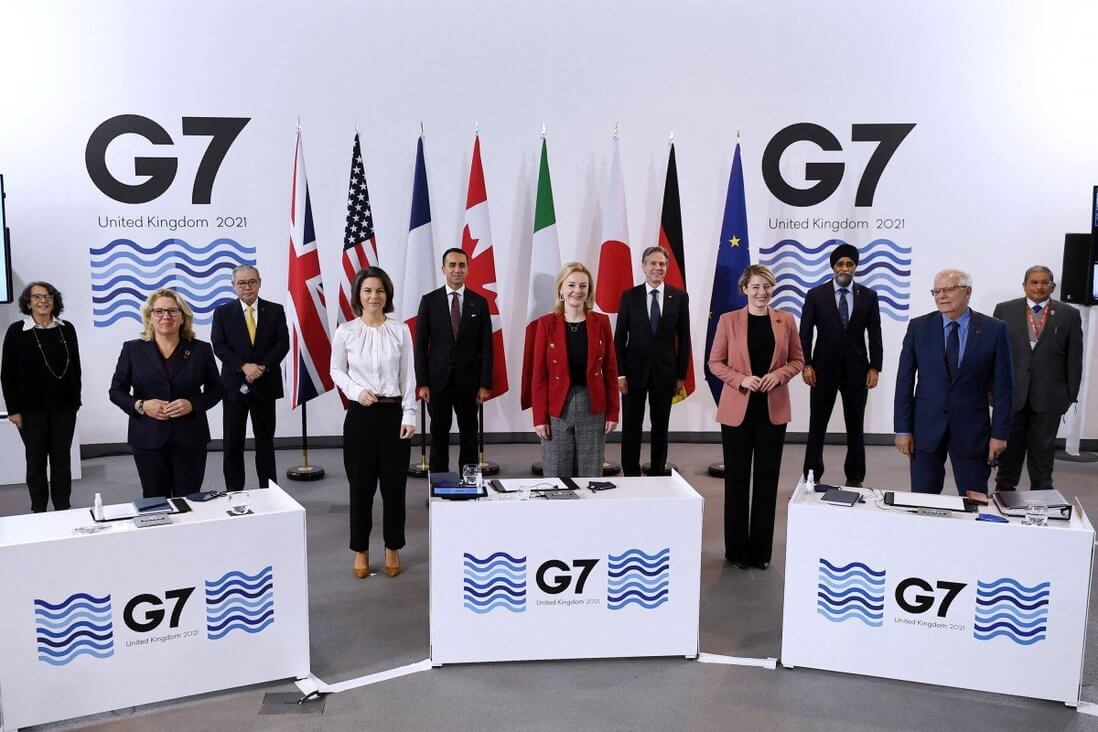The foreign ministers (FMs) of the Group of Seven (G7) countries—the United Kingdom (UK), Canada, Germany, France, Italy, Japan, and the United States (US)—and European Union (EU) representatives met in Liverpool on Saturday in a “show of unity against global aggressors,” focusing primarily on Russia, China, and Iran.
The meeting was hosted by British Foreign Secretary Liz Truss and was the second time the envoys of the G7 gathered in the UK in 2021. The previous meeting was in August when envoys met to discuss the Afghan crisis.
🇬🇧🌍 At the #G7 this weekend we have shown that the world’s largest economies are united.
— Liz Truss (@trussliz) December 12, 2021
We stand for freedom and democracy and the right of all people to live free from oppression. Read our joint statement 👇https://t.co/vynGAlZX9J
The following is a brief summary of the meeting:
Russia/Ukraine:
The main focus of the meeting was regarding the potential invasion of Ukraine by Russia, following reports of increased Russian troop activity along its border with Ukraine.
A joint statement released by the G7 FMs said the Group unanimously condemns “Russia’s military build-up and aggressive rhetoric towards Ukraine.” The statement called on Moscow to “de-escalate, pursue diplomatic channels, and abide by its international commitments on transparency of military activities.”
The G7 warned that Russia will face “massive consequences” if it continues with its “military aggression” against Ukraine.
“We reaffirm our unwavering commitment to Ukraine’s sovereignty and territorial integrity, as well as the right of any sovereign state to determine its own future. We commend Ukraine’s posture of restraint,” the statement added.
US intelligence sources have reported that Russia has amassed 175,000 troops at its border with Ukraine, with plans to invade in January. However, the Kremlin has denied these claims and urged the North Atlantic Treaty Organization (NATO) to suspend any plans for an eastward expansion.
WATCH: Foreign Secretary @TrussLiz's opening remarks at the @G7 Foreign and Development Ministers meeting in Liverpool today#G7UK pic.twitter.com/wh0FTsROWu
— Foreign, Commonwealth & Development Office (@FCDOGovUK) December 11, 2021
China:
The FMs also expressed concerns about China’s “coercive” economic policies and its debt-trap diplomacy. “We have been clear at this meeting this weekend that we are concerned about the coercive economic policies of China,” British Foreign Secretary Liz Truss said on Sunday, the second and final day of the meeting.
The FMs also met with representatives from the Association of Southeast Asian Nations (ASEAN), South Korea, and India to discuss China’s growing regional aggression, especially in the Indo-Pacific, and stressed their commitment to “maintaining a free and open Indo-Pacific region.”
Furthermore, they discussed China’s human rights violations in Hong and Xinjiang, and the “importance of peace and stability across the Taiwan Strait.”
Iran:
Regarding Iran, the FMs expressed concerns over steps taken by Tehran to accelerate its nuclear programme and its unwillingness to make compromises.
“This is the last chance for Iran to come to the negotiating table with a serious resolution to this issue which has to be agreeing the terms” of the 2015 nuclear deal, formally known as the Joint Comprehensive Plan of Action (JCPOA), Truss said. “We will not allow Iran to acquire a nuclear weapon and it is vital that they come to the table and are serious about the negotiations,” Truss added.
German Foreign Minister Annalena Baerbock also warned Iran that time is “running out” and argued that Tehran’s actions show its lack of commitment to achieving a deal.
World powers and Iran began the seventh round of negotiations to restore the JCPOA on November 29 after a five-month hiatus imposed by Iran’s new hardline government. However, talks were stalled once again, as the West accused Iran of greatly accelerating its nuclear programme. Negotiations restarted on Thursday with little hope of reviving the deal.
The FMs also met with each other separately on the sidelines of the meeting to strengthen their commitments and give them greater impetus by collaborating bilaterally.
🇬🇧🇺🇸 Met @SecBlinken in Liverpool for #G7 following the successful 🇺🇸 Summit for Democracy. We discussed:
— Liz Truss (@trussliz) December 10, 2021
➡️ Support for Ukraine in face of Russian aggression
➡️ Importance of reliable and honest investment into developing countries
➡️ Stopping Iran acquiring nuclear weapons pic.twitter.com/5Z29LLzPXb
US Secretary of State Antony Blinken met with Truss and his Australian counterpart Marise Payne to discuss China, Russia, and Iran and strengthen their commitments towards combating climate change and COVID-19.
Similarly, the Canadian FM Mélanie Joly met with EU High Representative Josep Borell to coordinate a global humanitarian response on the Afghan crisis and discussed the ongoing situation in Ethiopia, Iran, and Venezuela. Joly also met with her German counterpart Baerbock and “discussed ways to ensure coordinated responses to the Russian military buildup on Ukraine’s border.”
Additionally, the Japanese FM Hayashi Yoshimasa met with his counterparts from France, Australia, the US, and the UK. The talks mainly focused on bolstering Japan’s relations with all the countries and the G7, especially in light of China’s aggression in the Indo-Pacific region.
The envoys also discussed efforts to combat climate change, promoting the use of sustainable technologies, and joint efforts to stop the spread of the COVID-19 pandemic.

